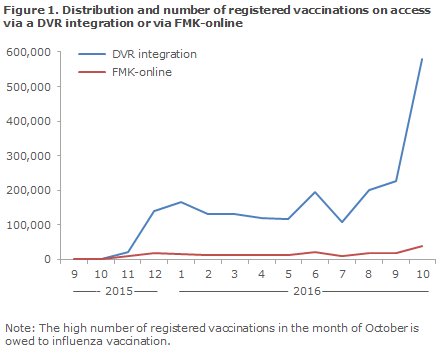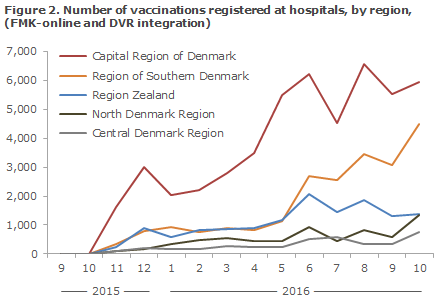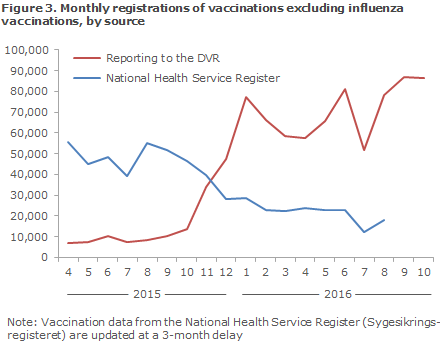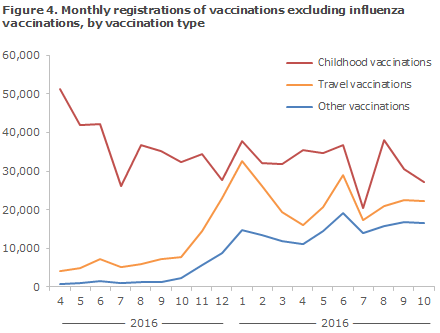No 45 - 2016
The first year with statutory registration of vaccinations in the Danish Vaccination Register
Influenza vaccine on back order
The first year with statutory registration of vaccinations in the Danish Vaccination Register
On 15 November 2015, physicians became duty bound to record all administered vaccinations in the Danish Vaccination Register (DVR) cf. Executive Order on Access to and Registration etc. of Medicinal Product and Vaccination Information, EPI-NEWS 45/15. The duty includes all vaccinations that carry the ATC code J07, i.e., not immunoglobulins or allergy vaccinations. The duty includes all physicians affiliated with medical practices, hospitals, vaccination clinics, etc. Physicians may authorise assistants to record vaccinations on their behalf. For more information (in Danish language) about the Danish Vaccination Register, please see here.
This issue of EPI-NEWS provides an update on the implementation of the DVR among users, covering the vaccinations registered during the first year after the notification duty came into force.
Update on the integration of electronic record systems with the DVR
Notification may be made either by integrating the DVR in the electronic health record system used, or via www.fmk-online.dk. All electronic record systems used by general practitioners are integrated with the DVR. Thus, all GPs should be able to report their vaccinations directly from within their own record system without needing to register vaccinations in several systems. GPs administer a greater number of vaccinations than any other group, which is reflected in Figure 1 where the majority of the vaccinations registered were entered via integrated solutions.

Data on the notifications show that many private vaccination clinics also register their vaccinations with the DVR. Hospitals in the Region of South Denmark and the Central Denmark Region have created a link to FMK-online from their electronic patient record systems. The remaining three regions have planned similar links or direct integration with the DVR.
The monthly number of recorded vaccinations at hospitals in the five regions is presented in Figure 2. The greatest number of vaccinations was recorded in the Capital Region of Denmark and in Region Zealand. Physicians who do not yet have access to the DVR via their own record system may use FMK-online. The integration with the local record systems is continuously monitored by the Danish Health Data Authority.

Update on reporting to the DVR
Before the duty to report came into force, vaccinations were mainly entered into the DVR on the basis of information from the National Health Service Register about childhood vaccinations and influenza vaccinations that had been settled with the Region in question. These vaccinations were recorded with a delay of up to three months. Now, physicians are increasingly entering vaccinations directly into the DVR, including information about the product name and batch number, Figure 3.
In October 2015, only 5,500 vaccinations were registered directly in the DVR by the physicians. For comparison, in October 2016 a total of 455,000 vaccinations were entered directly into the DVR. If information about vaccinations is subsequently added via the National Health Service Register, and such information has previously been registered in the DVR, it will be linked to avoid repeat registrations.
In August 2016, the most recent month with updated information from the National Health Service Register, only 19% of the total number of vaccinations were entered on the basis of data from the Register.

Figure 4 presents the distribution of registered vaccinations by vaccine type, excluding influenza vaccinations. Now, more vaccinations than the childhood vaccinations are being registered; in fact, childhood vaccinations comprised only 40% of the total number of vaccinations, excluding influenza vaccinations, registered directly in the DVR in October 2016.

DVR views
Authorised health workers and physician assistants may view the vaccination cards of the patients who are in their care. Additionally, citizens can access the DVR and view their own and their children's (if any) vaccination status, provided the children were born after 27 May 2004. The average number of monthly views performed by health workers has remained at approx. 160,000 from January to September 2016, and the corresponding number of views performed by citizens was approx. 6,500.
Completion of the paper vaccination card
Paper vaccination cards are available for childhood vaccinations, supplementary vaccinations and travel vaccinations. The childhood vaccination card and the card used for supplementary vaccinations are printed by Statens Serum Institut (SSI) and sent free of charge to physicians on request. The international vaccination card is prepared by the WHO and is available at the WHO's web site. Printed copies of the international vaccination card can be ordered from the SSI.
According to the Danish Health Authority’s ”Executive Order on Authorised Healthcare Professionals' Patient Health Records” use of vaccines and other similar biological products, including the batch numbers of such products, shall be kept on record”. Furthermore, physicians have a duty to register vaccinations in the DVR. But filling in the vaccination card is not a statutory requirement.
Special requirements for documentation of certain vaccinations may apply for travels abroad, e.g. yellow fever vaccination, polio booster vaccination for travels from certain countries with circulating polio virus, and meningococcal vaccination in connection with pilgrimage to Mecca. Yellow fever vaccination shall be documented by a special stamp, which may be ordered on the website of the Danish Health Authority. It is therefore important that such vaccinations are documented in the international travel vaccination card (for yellow fever, such documentation is a requirement).
The SSI and the National Health Authority therefore recommend that the international vaccination card be filled in for vaccinations that may require documentation abroad. Completion of vaccination cards for childhood vaccinations, influenza vaccinations, tetanus and diphtheria vaccinations and similar vaccinations may be omitted provided the physician registers the vaccinations directly in the DVR. One exception is vaccinations given to children below 15 years of age who were born before 28 May 2004, as the parents of these children do not have access to their child’s vaccination information in the DVR. We recommend that the physician discusses with the citizen if he or she would prefer to keep a vaccination card or not.
Physicians as well as citizens may register previously administered vaccinations that are listed on the paper vaccination card in the Danish Vaccination Register in order to keep their vaccination information in a single place. Vaccinations added by a citizen must be validated by the citizen's doctor.
Commentary
Since the duty to register vaccinations came into force in November 2015, the DVR has been used actively, particularly by GPs but also by many vaccination clinics. The hospitals primarily register vaccinations via FMK-online, but plans are in place to integrate hospital systems with the DVR in several regions. As the SSI does not know the total number of vaccinations given, it is difficult to assess the scope of lacking registrations in the DVR. However, the SSI assumes that not all vaccinations given at hospitals are being registered.
In time, the DVR will provide health workers and citizens with access to a single resource with updated vaccination information. Additionally, the data in the DVR are regularly used to report data on vaccination coverage and for studies of the safety and efficacy of vaccines. Data are also used to remind parents of lacking vaccinations of their children, which has had a documented positive effect on vaccination coverage, EPI-NEWS 4/15. When the DVR is used actively by physicians, the Danish paper vaccination cards can be phased out.
(T.G. Krause, Infectious Disease Epidemiology, L. Ærbo, The Danish Health Data Authority)
Influenza vaccine on back order
Influenza vaccines are currently sold out at the SSI. The demand for vaccines has been extraordinarily strong, and nearly 100,000 more vaccines than last year have already been sold. The Institute has acquired additional doses in foreign language packaging. We expect that these doses will be ready for dispensing as from Week 47. If a vaccination cannot be postponed until Week 47, influenza vaccination may be purchased through a pharmacy.
(Statens Serum Institut)
Link to previous issues of EPI-NEWS
9. November 2016